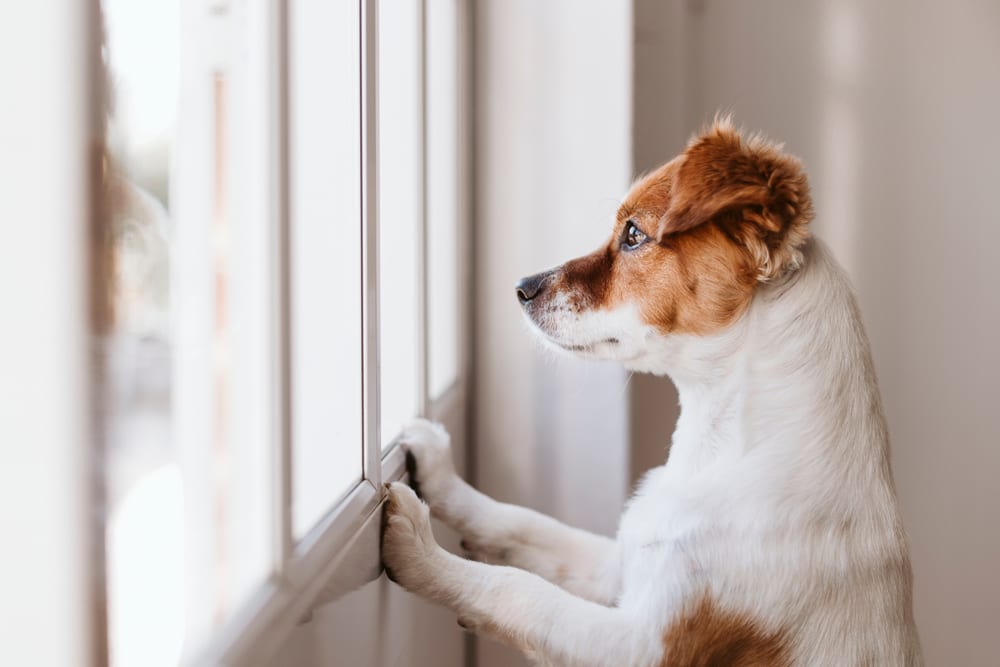
At Home
Expert tips on looking after your pet through lockdown
5 years ago

Lockdown has seen a rapid increase in pet ownership.
With most of us spending more time at home, many have seen it as the best time to fulfil a long-held desire to have a furry friend around the place.
According to the Kennel Club, pet registrations have soared by a quarter since the first UK lockdown.
However, spending more time at home with our pets can bring its challenges as well as fun.
From doing the right amount of exercise to making sure your dogs and cats don’t gain lockdown weight, our friends at PetExx, the pet nutrition specialists, bring us their guide to caring for your furry friends during the pandemic.
Exercise

For most of us lockdown has resulted in more time at home and we are relishing the chance to get outside. Now we know how our pets feel!
The amount of exercise your dog needs varies from breed to breed. If you’re considering a lockdown puppy then really do your research.
A large working breed like a Labrador could need up to two hours exercise every day, a Yorkshire Terrier more like 30 minutes, while breeds like spaniels love water so worth considering if you live near the beach.
The message is clear – if you’re going to get a dog, pick a breed that suits your lifestyle now AND after lockdown.
Dogs don’t just need physical exercise, they need a brain workout too. Playtime and games are equally important.
Consider a puzzle bowl to challenge their mind while they eat or save up old delivery boxes and paper packaging to make a fun destruction course.
Remember you can overwork your dogs, particularly when they are really young or as they get older.

Joint supplements are an important part of your dog and cats’ diet, particularly as they age.
Added ingredients like glucosamine, omega 3, turmeric and green lipped mussel are effective for supporting joints, reducing inflammation and keeping your best friend healthy and happy on their walks.
If they develop an obvious limp you should consult your vet.
Diet and Nutrition

Pets are just like humans – if they eat too much and exercise too little they will gain weight. This can be extremely dangerous. The phrase ‘killing with kindness’ has never been truer than when applied to our pets.
If you want to earn their love by constantly feeding them unhealthy treats you are only going to cause long term problems.
It’s hard to resist the hungry expression of a dog, especially when you are with them 24/7 so we recommend healthy, low fat treats like fish skin cubes which are easily available for home delivery.
You could also cut up some chicken or carrots into bite size treats to keep in the fridge. Fish sticks and carrots are also really good for your dogs’ teeth.
Some dogs will develop digestive issues and you might notice this now you’re spending more time together.
If your dog drags their bottom along the floor, that could suggest anal gland issues. Consult your vet and consider adding fibre to their diet. This is available in powder form to sprinkle on their food.

Most dogs will suffer with and upset stomach and diarrhoea at some point and for an owner it’s just about the worst thing. The solution is to have a syringe of probiotics available at all times and also to simplify the food they take for a day or two.
Behaviour

More time at home gives you the opportunity to observe the behaviour of your cats and dogs, so now is the time to act if you think their behaviour is changing.
Like humans, pets can experience brain degeneration. Are they wandering, circling or becoming withdrawn? These are all warning signs. The statistics are one in five dogs will suffer from cognitive dysfunction but only one in ten of those will ever be diagnosed. Every owner would love to extend the life of their pet and in twilight years the quality of life.
As animals age it is more important than ever to ensure they have a balanced diet and are getting some of the extra nutrients and antioxidants to help them age well.
Green tea, gingko biloba and omega 3 fatty acids are things you should consider adding to their diets, but in controlled amounts.

You can get all three in nutritional supplements that you can add to their food.
Just like young children you can sneak some extra goodness into their food without them noticing, safe in the knowledge you’re helping them to better health.
Skin and coat

During the first lockdown, dogs suffered like the rest of us from not being able to get to the groomers.
This time around pet parlours are allowed to open but only for essential grooming considered for welfare.
Home grooming is a great time to have a really good look at your pets’ skin and coats.
Is their fur as healthy as it should be? Or is it a bit dull and thin when it should be luscious and shiny?
Of course, some coats are meant to be wiry but if you see a deterioration in your dog or cat’s coat it could be a result of a diet deficiency.
Or if your pet is excessively licking or scratching their fur it could be a sign they’re suffering from a skin condition. You should check with your vet.
In addition to any medication prescribed, have a look at your pet’s diet. Just like humans, their skin and fur can show the signs of deficiencies in their food.
Supplements containing fish and flaxseed oils are good sources of omega 3 fatty acids and are great for skin and fur. Or add some oily fish into their food two or three days a week.
Stress and separation anxiety

Of course, all this time at home with our pets during lockdown is brilliant but what is going to happen when we return to work, socialising and holidays?
Our pets have got used to us being around and even the most independent pooch or moggie might suffer from some separation anxiety.
It is a good idea to try some exercises to get them used to being apart – even when you are still in the same house as them.
Try to build up the amount of time they spend alone gradually, ensure they have a comfortable environment where they feel safe on their own, be patient and follow the advice of experts like the Kennel Club or Dogs Trust.

You can also add supplements to their diet with proven ingredients to help soothe their anxiety, like the herb valerian. Taken as part of a balanced diet, and in the correct amounts it can help as a short-term measure.
If your pet is suffering extreme anxiety it could be linked to a more serious behavioural issue so seek the advice of your vet.









 Subscribe
Subscribe Follow Us
Follow Us Follow Us
Follow Us Follow Us
Follow Us Follow Us
Follow Us Follow Us
Follow Us











